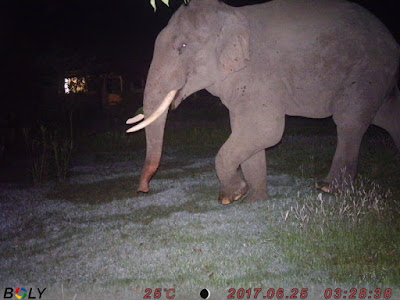"Something lurks in the night, I don't know what..." Actually a lot of the time I do, especially when elephants come this close. You can see by the date that Messi has been depriving us of sleep for a while now. With leopards, it's a little different and with a cat as big as the Boss it can be disconcerting when you check equipment and realize he was there not much earlier. It's all about food, with elephants you don't want to be in the way if they come shopping, with leopards you simply don't want to be the food...
Leopards are courageous but risk averse. Each leopard has a different way of operating, in the forest and near human structures. Nothing can ever be taken for granted, the learning is ongoing. I often get asked about leopard behaviour, the most common question being how big is their range? Well that's a bit like one Martian asking another Martian what do humans eat? It varies. There are so many variables in the way a leopard behaves, works its range, we still know so little.
Data helps tell the story, some of the time but it's important not to generalize. Sadly, some info we can make a sweeping statement on is something I touched on a few days ago, how leopards don't trigger the same response (interest) as the "hotshot" species. Today, after digging holes in the rehab zone I got back to some info re keyword response, and yep, it just confirms it, out there you're just not as interested in protecting the spotted cat as you are other animals. More on this soon, pray I'll be subtle, I may not be.
That is what it is, we get on with it, deal with it. I don't dwell on it when I'm in the jungle where due to the nature of my work I am often alone. So when I get back to base and have conversations with others of my species, well, being from a different culture, I get asked many things.
One topic that frequently comes up is arranged marriages which in Nepal are still the norm. There are more and more love marriages but it's interesting, the divorce rate here is very low. I often get asked what I think about arranged marriages v love marriages.
Leopards are courageous but risk averse. Each leopard has a different way of operating, in the forest and near human structures. Nothing can ever be taken for granted, the learning is ongoing. I often get asked about leopard behaviour, the most common question being how big is their range? Well that's a bit like one Martian asking another Martian what do humans eat? It varies. There are so many variables in the way a leopard behaves, works its range, we still know so little.
Data helps tell the story, some of the time but it's important not to generalize. Sadly, some info we can make a sweeping statement on is something I touched on a few days ago, how leopards don't trigger the same response (interest) as the "hotshot" species. Today, after digging holes in the rehab zone I got back to some info re keyword response, and yep, it just confirms it, out there you're just not as interested in protecting the spotted cat as you are other animals. More on this soon, pray I'll be subtle, I may not be.
That is what it is, we get on with it, deal with it. I don't dwell on it when I'm in the jungle where due to the nature of my work I am often alone. So when I get back to base and have conversations with others of my species, well, being from a different culture, I get asked many things.
One topic that frequently comes up is arranged marriages which in Nepal are still the norm. There are more and more love marriages but it's interesting, the divorce rate here is very low. I often get asked what I think about arranged marriages v love marriages.
My standard response is "to me, both are quite dangerous."
Anyway, it's been a long time since I wore a wedding band (probably sold it to buy equipment for my work) so I'm far from an expert, probably know more about leopards (safer?) and I still have so much to learn about the great cat.
But all coexistence has challenges... that much I do know...
But all coexistence has challenges... that much I do know...





